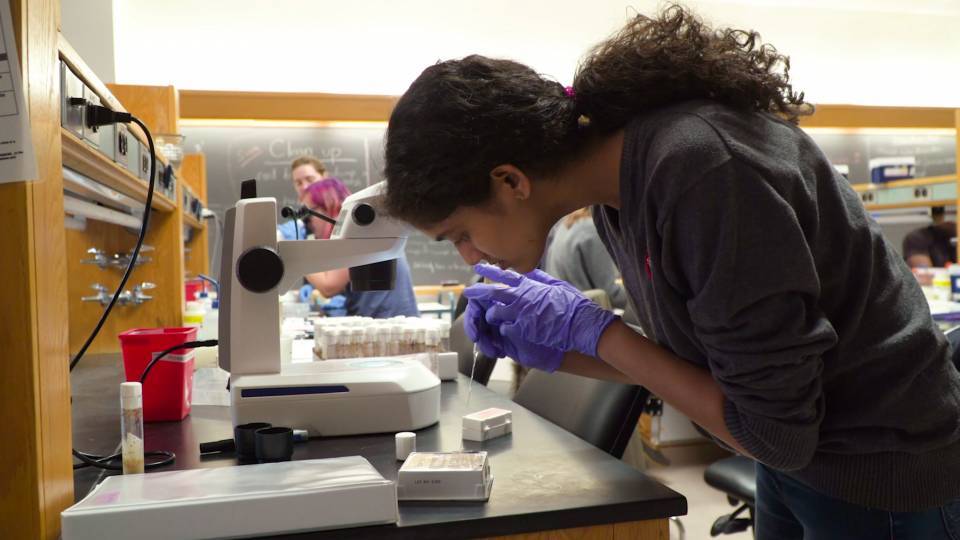Applications are being accepted for presenters at the 2019 Princeton Research Day, the fourth annual campus-wide celebration of research and creative endeavors by the University’s undergraduates, graduate students, postdoctoral researchers and other nonfaculty researchers.
The May 9, 2019, event encourages students, early-career researchers and artists to share their work in a way that connects with a general-interest audience through short talks, poster presentations, performances, art exhibitions, demonstrations and digital presentations. Topics will represent a wide range of research and inquiry across the University, including natural sciences, social sciences, engineering, arts and humanities.
The free, public event will be held in the Frist Campus Center and will conclude with an awards ceremony for outstanding contributions. Applications, which are being accepted on the Princeton Research Day website, are due by Feb. 18.
The 2019 Princeton Research Day will feature a full day of events, building on the success of the 2018 event, which attracted about 200 presenters, 600 attendees in person and thousands more watching the livestream.
“Princeton Research Day is a festival of ideas that includes everything from art to aeronautics and philosophy to physics,” said Karla Ewalt, associate dean for research and current acting dean for research. “It is not a traditional conference where scholars go to test their ideas with experts in their own field. Instead, it is a unique happening where researchers of all stripes share their passions, concepts and discoveries with a broadly inquisitive audience.”
“Each year at Princeton Research Day I have been impressed and inspired by the presenters’ ingenuity and dedication to their work,” said Provost Deborah Prentice, the Alexander Stewart 1886 Professor of Psychology and Public Affairs. “I look forward to learning from a new group of extraordinary researchers and artists in 2019.”
Princeton Research Day provides a forum for students, postdocs and others to present their findings and innovations in short, digestible formats. The projects presented can be works in progress or completed endeavors. Participants are challenged to present their research in ways that anyone can understand, and can take advantage of resources to help refine their presentations.
Eric Teitelbaum, a graduate student in architecture, was the Graduate Student Impact award winner for a 10-minute talk in 2018. He shared his progress on developing “The Cold Tube,” a specialized mobile pavilion that uses materials with radiant cooling properties to keep occupants comfortable in hot, humid environments.
“It’s a different mode of comfort, it’s a different mode of cooling, and it’s never really been done before to this scale,” explained Teitelbaum, who is now testing a prototype of the pavilion in steamy Singapore. A Princeton Research Day presentation “really makes you put your work in context” for a general audience, “and that’s useful for any researcher,” he said.
Lucas Ramos, a senior history major, gave a talk at the 2018 Princeton Research Day on research he conducted for his fall semester junior paper. His work explored the life, poetry and activism of Lola Rodríguez de Tió, an important figure in the 19th-century movement for Puerto Rican independence.
As his first public research presentation, said Ramos, his Princeton Research Day experience laid the groundwork for academic conference talks during his senior year as he prepares to apply to Ph.D. programs.
Yasmine Eichbaum, a senior chemistry major, also viewed the 2018 Princeton Research Day as a chance to extend the impact of research she undertook as part of her coursework. Eichbaum and Colin Yost, her partner on an independent laboratory project for the course “Experimental Chemistry,” delivered a talk on their investigations into the function of a protein that is closely related to amyloid beta 42, which forms plaques in the brain that are implicated in Alzheimer’s disease.
“It felt empowering that as undergrads working on a project for six weeks, we were given the same space to present our work” as graduate students and postdocs, said Eichbaum. She found it valuable to look at her research topic from an outside perspective. “In some ways, the Princeton Research Day format is part of the research process, in that it brings you back to the ‘so what?’ of your research,” she said.
Nora Willett, a graduate student in computer science, first presented at the inaugural 2016 Princeton Research Day as a way to practice describing her work in advance of her general examinations. She said she enjoyed the challenge of thinking about “how you can convey your ideas to people who are not in your field and make it exciting for them.”
In 2018, Willett received the Silver Graduate Student award for her 10-minute talk demonstrating a method she created for controlling the hand gestures of live animation characters. Giving a short talk to a broad audience, she said, “makes you think really closely about, ‘What is the key idea in my research? How can I quickly tell someone how important this is, what it’s applicable for, and what’s the cool thing that I did?’”
The application, information about the event, and tips to help participants craft their presentations can be found on the Princeton Research Day website. The social media hashtag for the event is #PRD19.
The event is a collaborative initiative among the offices of the Dean of the College, Dean of the Faculty, Dean of the Graduate School and Dean for Research, with support from the Office of the Provost.





